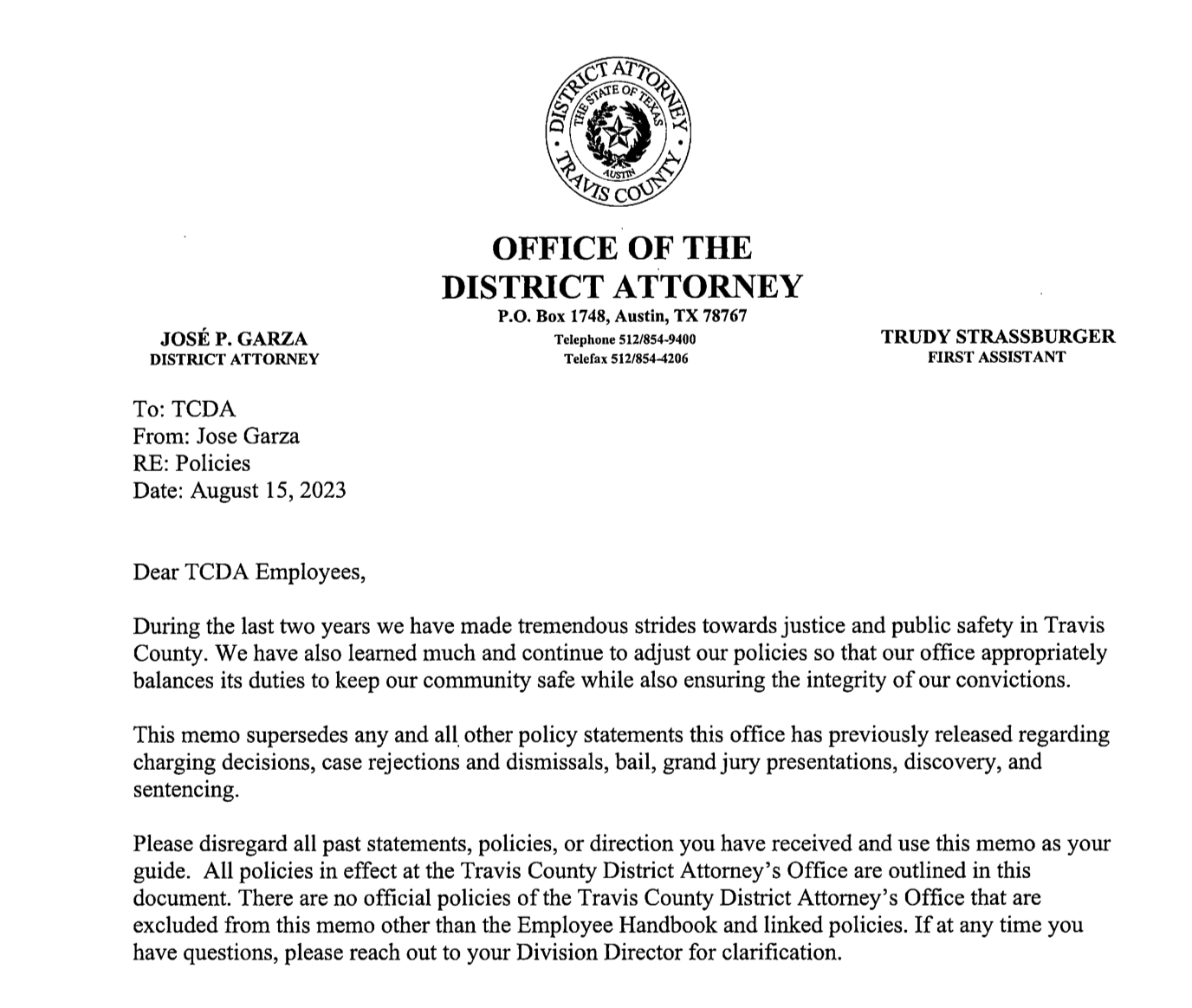Alleged Leaked Memo from Travis DA Jose Garza. Reads like Progressive Manifesto
LEAKED MEMO: DA José Garza’s internal guidelines resemble an activist playbook for decriminalization. Prosecutors are instructed to minimize jail time, reduce charges, and treat offenders like clients rather than criminals.
Here’s a breakdown of Garza’s directives contrasted with what a DA prioritizing public safety and legal accountability should do instead.
ON IMPLICIT BIAS: The memo urges prosecutors to scrutinize their own biases regarding race, gender, sexual orientation, and class when evaluating cases, suggesting these may unconsciously skew sentencing decisions.
This shifts focus from evidence-based prosecution to subjective social science exercises. Prosecutors should rely on facts and legal standards, not speculative bias checks that risk inconsistent outcomes and undermine tough sentencing.
ON OFFENDERS’ HARDSHIPS: Prosecutors are directed to consider factors like immigration status, employment, housing, or licensing before recommending punishment.
Sentencing exists to protect society and deter crime—these considerations belong to judges, parole boards, or lawmakers. Prioritizing an offender’s personal circumstances over victims’ harm misplaces sympathy and weakens accountability.
ON INCARCERATION: The memo claims jail and prison are the least effective rehabilitation tools, citing “research.”
This reflects a preference for selective studies over enforcing laws passed by elected officials. Prosecutors should uphold the law as written, not push personal policy agendas based on questionable research.
FURTHER ON INCARCERATION: Prosecutors are told to recommend jail only when an offender poses a clear public safety threat.
This ignores the broader purposes of sentencing—justice, deterrence, punishment, and rehabilitation. All factors should be balanced, not reduced to subjective public safety assessments by prosecutors.
ON DRUG CRIMES: Jail or prison for drug and victimless offenses should only be pursued for public safety reasons.
This establishes a default “no-jail” policy for many non-violent felonies, even for repeat offenders. Standard practice applies statutory penalties based on the crime and criminal history. Tough-on-crime jurisdictions use prison for repeat drug dealers for a reason—incarceration is a legal consequence.
ON YOUNG OFFENDERS: The memo advocates for leniency toward young offenders unless they pose a public safety risk.
This creates an automatic presumption of leniency based on age, disregarding crime severity or victim impact. Age should be one factor among many, not a blanket excuse for softer penalties.
ON SENTENCE ENHANCEMENTS: Enhancements, like those for prior convictions, should only be used if the past offense relates to the current charge, and harsh penalties require a clear public safety justification.
This policy spares repeat offenders from tougher sentences, undermining Texas law’s intent to enhance penalties for career criminals. Enhancements are critical tools to deter recidivism, not rewards for persistent offending.
ON PROBATION VIOLATIONS: Revoking probation with jail time is limited to cases involving new violent arrests or absconding, tying punishment to direct community safety risks.
This allows offenders to violate probation—miss drug tests, skip rehab, or ignore supervision—without consequences. Effective probation requires swift enforcement, not leniency that renders terms optional until harm occurs.
ON GPS AND ELECTRONIC MONITORS: Prosecutors are encouraged to lift GPS or monitoring conditions after 3–6 months if no violations occur.
Monitors are imposed for judicially determined public safety reasons. Automatically removing them after a set period, regardless of the case’s context, risks community safety and signals guaranteed leniency to offenders.
ON VICTIM INPUT: The memo prohibits asking victims for specific sentencing recommendations, with prosecutors retaining final authority over plea offers.
This deliberately mutes victims’ voices, limiting their role in the justice process. Excluding victims from suggesting sentences prioritizes offenders’ interests and sidelines those harmed.
ON BAIL: For non-incarceration outcomes like probation or diversion, prosecutors should not oppose affordable or personal recognizance (PR) bonds without director approval.
Bail decisions should be case-specific, based on flight risk, public safety, and legal factors, not blanket policies. Magistrates, not DA ideology, should independently determine bail based on evidence.
FURTHER ON BAIL: If prosecutors believe a defendant poses no public safety risk, they’re instructed to proactively offer PR bonds to defense attorneys before hearings.
This turns prosecutors into defense advocates, preempting judicial bail decisions. Prosecutors should present evidence to magistrates, not negotiate favorable deals before hearings begin.
ON SENTENCE CAPS: Sentences exceeding 20 years require approval from the plea board, director, or DA.
This bureaucratic hurdle restricts prosecutors from seeking appropriate penalties for serious crimes like murder or rape. A law-and-order DA trusts prosecutors to pursue the full range of penalties without political oversight.
ON FLIGHT RISK: The memo differentiates “flight risk” from “attendance risk,” implying skipping court isn’t a serious offense.
Texas law doesn’t recognize “attendance risk.” This artificial distinction allows offenders to evade court without significant consequences, weakening accountability.
ON UNCOOPERATIVE WITNESSES: Cases reliant on uncooperative witnesses won’t proceed to a grand jury if the witness is essential.
This incentivizes dropping cases, especially violent ones, when witnesses are reluctant. Diligent prosecutors use subpoenas, alternative evidence, or investigations to build cases, not abandon them.
ON DISMISSALS: The memo lists broad grounds for dismissing cases, including vague “Interest of Justice” reasons requiring director approval.
This encourages systematic dismissals beyond legal norms. Dismissals should be rare, grounded in clear legal issues like insufficient evidence, not driven


Where can we see the whole Memo?